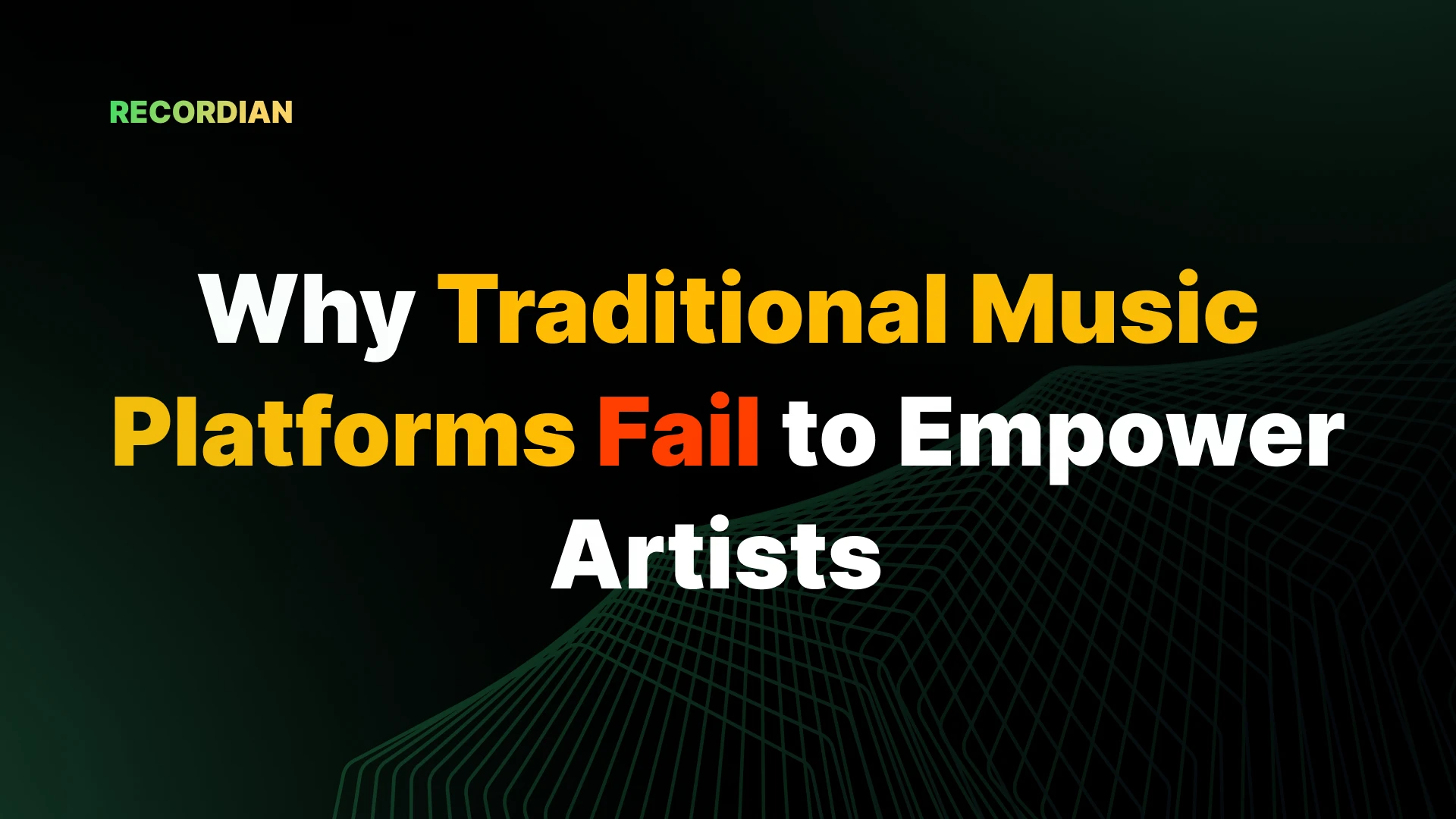Why Traditional Music Platforms Fail to Empower Artists
The digital revolution brought about by music streaming services promised to democratize the music industry, offering unprecedented access to vast libraries of music and the potential for artists to reach global audiences. However, as the industry has matured, significant shortcomings have become apparent. Major streaming platforms like Spotify, Apple Music, and Amazon Music, while convenient for listeners, often fail to empower the very creators they rely on. This article explores the issues faced by artists on traditional music platforms, the implications of recent changes, and how Recordian addresses these challenges.
The Financial Strain of Streaming Payouts
Besides the issue of insignificant payouts per stream, Spotify recently increased its subscription prices (https://www.businessofapps.com/data/social-app-report/), but this change has not translated into better compensation for artists. Instead, the additional revenue primarily benefits the platform and major record labels, perpetuating a cycle of minimal financial returns for musicians.
The 1,000 Stream Threshold
Adding to the financial burden, Spotify's policy requires that songs reach a threshold of 1,000 streams before artists can earn any royalties (https://www.businessofapps.com/data/social-app-report/). This policy disproportionately affects emerging and independent artists who struggle to achieve this milestone, effectively leaving many without any income from their music on the platform. Such barriers discourage new talent and stifle the diversity of music available to listeners.
Artist Control and Transparency Issues
Traditional streaming platforms also fall short in providing artists with control over their work and transparency regarding earnings. Algorithms and editorial playlists largely determine which songs get promoted, often favoring already popular tracks and major label artists. This system marginalizes independent musicians and makes it difficult for new voices to be heard.
Additionally, artists frequently encounter opaque royalty calculations and distribution processes, leading to discrepancies in earnings. Without clear insight into how their revenue is generated and distributed, artists are left in the dark about their financial health and future prospects.
High-Profile Artist Withdrawals
The dissatisfaction with traditional streaming models has led several high-profile artists to withdraw their music from these platforms. Taylor Swift famously pulled her catalog from Spotify in 2014, criticizing the platform's compensation model, although she later returned after negotiations. More recently, artists like Neil Young and Joni Mitchell have removed their music from Spotify, citing various grievances (https://www.businessofapps.com/data/social-app-report/). Such moves underscore the growing discontent among musicians regarding how their work is valued and monetized.
Advocacy for Change
The push for better artist compensation and control has gained momentum, with many artists and advocacy groups calling for reforms. Organizations like the Union of Musicians and Allied Workers (UMAW) have been vocal in demanding fairer pay and greater transparency from streaming services (https://www.businessofapps.com/data/social-app-report/). These efforts highlight the need for systemic changes to ensure that artists receive fair compensation for their contributions.
How Recordian Empowers Artists
Recordian was built by artists for artists, with a mission to address the shortcomings of traditional music platforms and create an empowering ecosystem for musicians. Here’s how Recordian solves these issues:
- Fair Compensation: Recordian offers better payouts per stream, ensuring that artists receive a fairer share of the revenue generated from their music. By cutting out middlemen, we maximize earnings directly for the artists.
- NFT Marketplace: Artists can earn additional income by creating and selling NFTs of their music, artwork, and exclusive content. This innovative approach allows artists to monetize their creativity in new and exciting ways.
- Transparency: Our platform provides clear and detailed analytics, giving artists full visibility into their earnings and how their music is performing. This transparency fosters trust and enables artists to make informed decisions about their careers.
- Eliminating Barriers: Unlike traditional platforms, Recordian does not impose entry barriers such as the 1,000 stream threshold. We ensure that all artists, regardless of their reach, can earn from their music from the very first stream.
- Ad Studio: Recordian's Ad Studio enables artists to run targeted ad campaigns across our ecosystem, enhancing their visibility and engagement with fans.
Conclusion
The challenges faced by artists on traditional music platforms are multifaceted and deeply entrenched. However, by recognizing these issues and advocating for change, the industry can move towards a more equitable and sustainable future for musicians. Recordian stands at the forefront of this movement, offering a platform that genuinely empowers artists and addresses the critical shortcomings of the current music streaming landscape.
By providing fair compensation, enhancing transparency, and eliminating unnecessary barriers, Recordian is committed to transforming the music industry and ensuring that artists receive the recognition and rewards they deserve.
